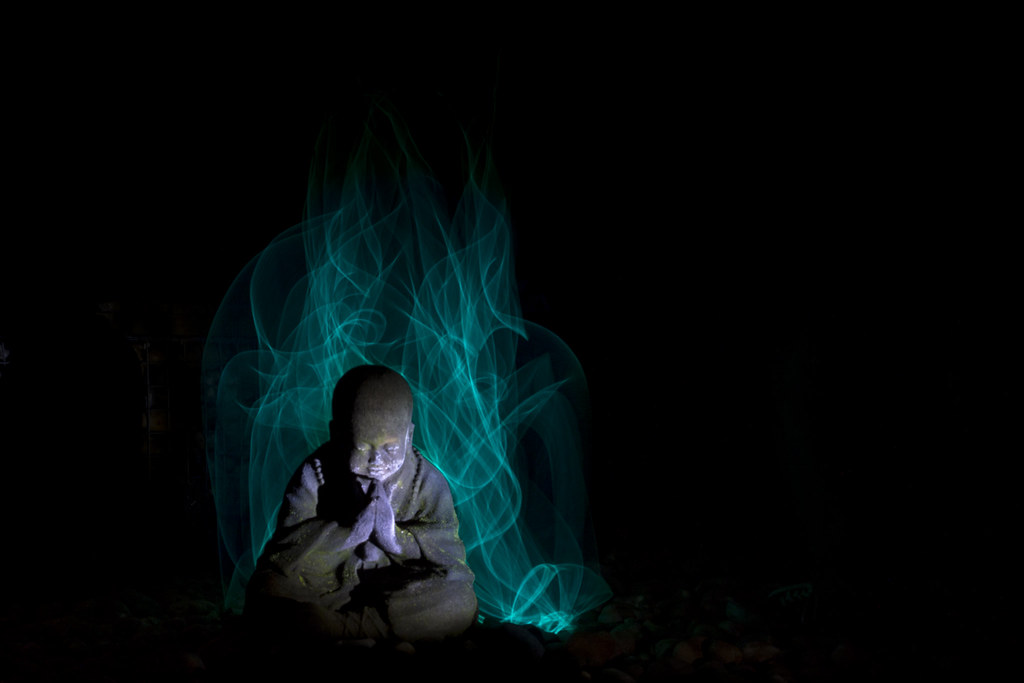 Submitted by Kam on
Submitted by Kam on

Once upon a time, in a certain place in southern China, a Buddhist priest lived as a hermit in a small cave, practicing austerities in order to purify himself so that he could enter the Western Paradise (Xī Tiān 西天) and become a buddha.
One day he decided that he had practiced austerities long enough, and that it was time to travel west and look for the way to the Western Paradise. So he put on what passed for his best robe, and took the little hollow wooden “fish” he thumped on when he chanted scriptures, and set out.
He walked for many days. One day as he was resting beside the road, a hog butcher came by.
“Where are you headed, Master?” asked the hog butcher.
“I have set out to enter the Western Paradise and become a buddha,” answered the priest.
“Oh, that’s wonderful,” exclaimed the butcher. “Alas, a person like me, with his hands drenched in blood, can never hope to attain the Western Paradise.” And he sighed a great sigh, for he had never really liked slaughtering hogs. It was simply a family business, and one must work in a family business whether one likes it or not.
“Of course, that’s true,” replied the priest. “You are surely doomed. Buddhism absolutely forbids taking life. Not only can you not hope to attain the Western Paradise, you are certainly going to the deepest court of hell to suffer unutterable tortures.”
This was not a comforting idea, and the butcher thought to himself: “I am quite unworthy in this life, of course. Oh, how I wish I could stop being a butcher and live as a virtuous vegetarian my the next life. What a terrible fate I have! But the Buddha is merciful, and perhaps if I implore this priest with a contrite heart he will plead my case in the Western Paradise when he gets there.” And so he decided what he had to do.
“On reverend master,” he said with tears in his eyes. “I implore you to present my contrite heart to the great Buddha and plead that he slightly reduce my horrible punishment.”
The priest had just started to roll his eyes with bemused skepticism when he remembered that a Buddhist should seek the salvation of all creatures, even butchers, and that he really ought to honor the naïve faith by which this simple man hoped to reform, or at least to escape his just punishment through the compassion of the great Buddha. So he agreed to present the butcher’s “contrite heart” to the Buddha in the Western Paradise.
To his surprise, when the butcher had said “present my contrite heart to the great Buddha,” he had meant this quite literally. The moment the priest nodded in agreement, the hog butcher took out his great knife, and with a single, skillful stroke, born of long years as a butcher, he cut out his own heart, handed it to the priest, and collapsed in death.
The shocked priest did not know what to do, but having agreed to convey the contrite heart of this simpleton, he wrapped it up, and took it with his wooden prayer fish and continued westward muttering prayers and invocations.
After a time, he came upon a small roadside temple. Out in front there was a large “spirit furnace” (shénzào 神灶), where believers burned written prayers and paper gifts to transmit them to the other world.
A Buddhist is not afraid of death, of course, but he can be just as disgusted as anybody else by the decay of what is dead, and the bloody heart had begun to emit an increasingly disagreeable odor. As he approached the spirit furnace, the priest made sure that no-one was around to see, and then quickly tumbled the revolting bit of flesh into the roaring and holy flames. He wasn’t really abandoning his trust, he reasoned, since the great Buddha would receive the contrite heart well enough this way, just as he received prayers and paper offerings. And anyway, there was not much future for a hog butcher, who would still have to go to the deepest hell and face the results of his wicked way of life.
But as the priest was reflecting on his good fortune and great ingenuity in finding a satisfactory way to rid himself of the rotting heart, the flames suddenly flared up so that they filled the whole furnace. As the fire roared, a figure seemed to appear in their midst: a frightening figure who looked like the dead butcher himself. “The Western Paradise is neither near nor far,” said the ghost. “It is located where there is a sincere heart. I thank you for your assistance, for now I have entered the Western Paradise, and have become a buddha!”
The priest was overcome with regret. He had much underestimated the great Buddha’s compassion for the truly contrite. And in disposing of the simple butcher’s gory relic, he had deliberately betrayed the trust that the man had in him. The butcher’s sincere repentance had outweighed his sin of killing hogs, so much so that it had even made him a buddha. The priest knew that he could never hope to do the same, for how could he ever hope to overcome his sin of betraying a trust?
*This is not a particularly widely circulated story, but it is typical of many popular tales comparing people who are pure in spirit to those who are impure, easily tempted, or sanctimoniously self-confident. Many such stories, like this one, are garbed in Buddhist trappings, but the underlying morality theme need not necessarily be Buddhist.*
Retold by DKJ
http://pages.ucsd.edu/~dkjordan/cgi-bin/chopera.pl?taleid=Story278
- 1221 reads